|
West Africa or Western Africa is the westernmost region of the African continent. Geopolitically, the
UN definition of Western Africa includes the following 16 countries distributed over an area of approximately 5 million square
km:
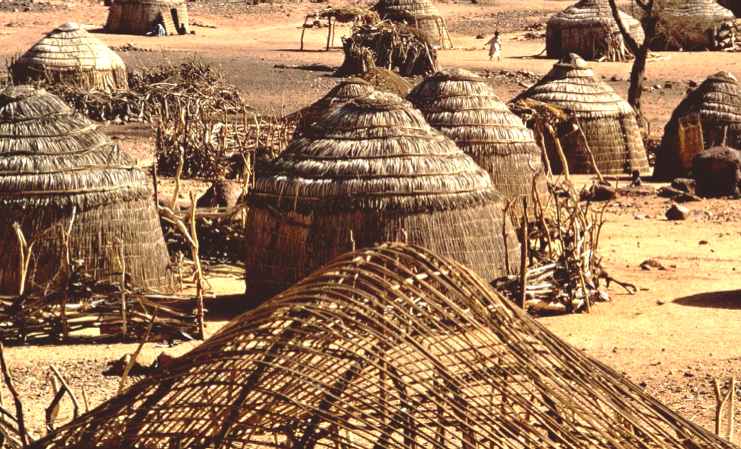
With the exception of Mauritania, all of these countries are members of the ECOWAS or Economic Community of West African States. The UN region also includes the island of Saint Helena, a British overseas territory in the South
Atlantic
Ocean.
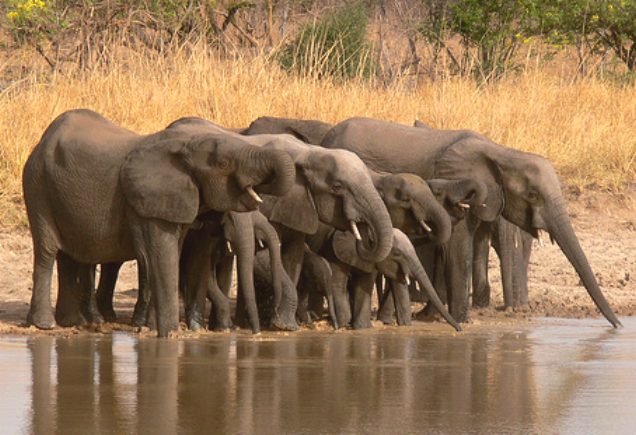
Background
West Africa is oriented west of an imagined north-south axis lying close to 10° east longitude. The Atlantic Ocean forms the western and southern borders of the region. The northern border is the Sahara Desert, with the Niger Bend generally considered the northernmost part of the region. The eastern border is less precise, with some placing it at the Benue Trough, and others on a line running from Mount Cameroon to Lake Chad.
Colonial boundaries are reflected in the modern boundaries between contemporary West African nations, cutting across ethnic and cultural lines, often dividing single ethnic groups between two or more countries.
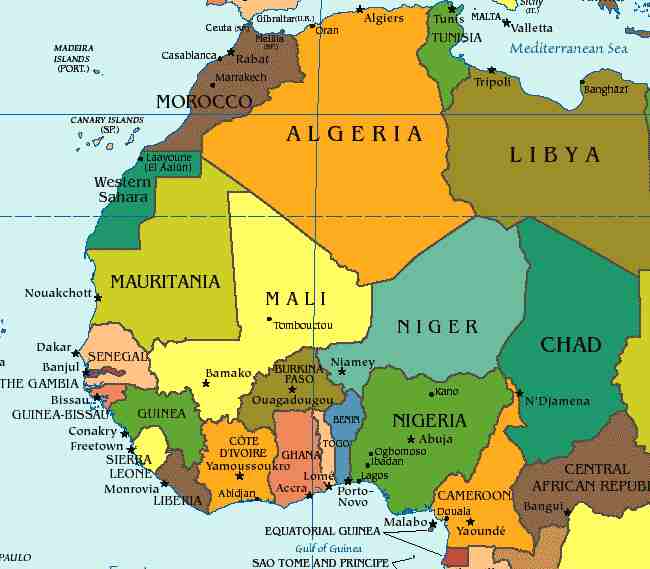
Map
of West Africa
Geography and climate
West Africa occupies an area in excess of 6,140,000 km², or approximately one-fifth of Africa. The vast majority of this land is plains lying less than 300 meters above sea level, though isolated high points exist in numerous countries along the southern shore of the region.
The northern section of West Africa is composed of semi-arid terrain known as Sahel, a transitional zone between the Sahara desert and the savannahs of the western Sudan forests form a third belt between the savannas and the southern coast, ranging from 160 km to 240 km in width.
Culture and religion
Despite the wide variety of cultures in West Africa, from Nigeria through to Senegal, there are general similarities in dress, cuisine, music and culture that are not shared extensively with groups not in the geographic region. Islam is the predominant historical religion of the West African interior and the far west coast of the continent; Christianity is the predominant religion in coastal regions of Nigeria, Ghana, and Cote d'Ivoire; and elements of indigenous religions are practised throughout. Before the decline of the Mali and Songhai Empires there was a sizable group of Jewish communities in areas like Mali, Senegal, Mauritania, and Nigeria. Today there are small Jewish populations in Ghana, Nigeria and Mali. Along with historic migrations, these religions have culturally linked the peoples of West Africa more than those in other parts of Sub-Saharan Africa.
The game Oware is quite popular in many parts of West Africa. soccer is also a pastime enjoyed by many, either spectating or playing. The national teams of some West African nations, especially Nigeria, Ghana and the Ivory Coast, regularly qualify for the World Cup.
Mbalax, Highlife, Fuji and Afrobeat are all modern musical genres which enjoin listeners in this region. Traditionally, musical and oral history as conveyed over generations by Griots are typical of West African culture.
A typical formal attire worn in this region is the flowing Boubou (also known as Agbada and Babariga), which has its origins in the clothing of nobility of various West African empires in the 12th century.
The Djembe drum, whose origins lie with the Mandinka peoples, is now a popularly played drum among many West African ethnic groups. The Djembe, along with the highly intricate woven Kente cloth of the Akan peoples of Ghana and the distinct Sudano-Sahelian architectural style seen in the many mosques of the region (see Djenné), are the primary symbolic icons of West African culture.
Family is an important aspect as well.

History
The history of West Africa can be divided into five major periods: first, its prehistory, in which the first human settlers arrived, developed agriculture, and made contact with peoples to the north; the second, the Iron Age empires that consolidated both intra-African, and extra-African trade, and developed centralized states; third, Major polities flourished, which would undergo an extensive history of contact with non-Africans; fourth, the colonial period, in which France and Great Britain controlled nearly the whole of the region; fifth, the post-independence era, in which the current nations were formed.
Prehistory
Early human people settlers, probably related to the Pygmies, arrived in West Africa around 12,000 B.C. Sedentary farming began around the fifth millennium B.C, as well as the domestication of cattle. By 400 B.C, ironworking technology allowed an expansion of agricultural productivity, and the first city-states formed. The domestication of the camel allowed the development of a cross-Saharan trade with cultures across the Sahara, including Carthage and the Berbers; major exports included gold, cotton cloth, metal ornaments and leather goods, which were then exchanged for salt, horses, and textiles.
Empires
The development of the region's economy allowed more centralized states and civilizations to form, beginning with the Nok civilization which began 500 B.C. and the Ghana Empire in the 8th century AD which stretched to the Mali empire. Based around the city of Kumbi Saleh in modern-day Mauritania, the empire came to dominate much of the region until its defeat by Almoravid invaders in 1052. The Sosso Empire sought to fill the void, but was defeated (c. 1240) by the Mandinka forces of Sundiata Keita, founder of the new Mali Empire. The Mali Empire continued to flourish for several centuries (most particularly under Sundiata's grandnephew), Kankan Musa I before a succession of weak rulers led to its collapse under Mossi, Tuareg and Songhai invaders. In the fifteenth century, the Songhai would form a new dominant state based around Gao, in the Songhai Empire, under the leadership of Sonni Ali and Askia Mohammed. Further south, Osei Tutu and Okomfo anokye have started to build the Empire of Ashanti Meanwhile, south of the Sudan, strong city states arose in Ife, Bono, and Benin around the fourteenth and fifteenth centuries. Further east, Oyo arose as the dominant Yoruba state and the Aro Confederacy as a dominant Igbo state in modern-day Nigeria.
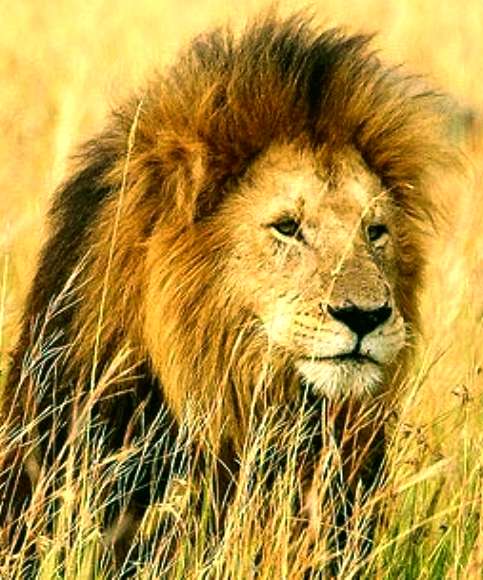
Slavery and European contact
Two slightly differing Okpoho manillas as used by Europeans to purchase slaves.Following the 1591 destruction of the Songhai capital by Moroccan invaders, a number of smaller states arose across West Africa, including the Bambara Empire of Ségou, the Bambara kingdom of Kaarta, the
Peul/Malinké kingdom of Khasso, and the Kénédougou Empire of Sikasso. Portuguese traders began establishing settlements along the coast in 1445, followed by the French and English; the African slave trade began not long after, which over the following centuries would debilitate the region's economy and population. The slave trade also encouraged the formation of states such as the Bambara Empire and Dahomey, whose economies largely depended on exchanging slaves for European firearms, which were then used to capture more slaves.
The expanding Atlantic slave trade produced significant populations of West Africans living in the New World, recently colonized by Europeans. The oldest known remains of African slaves in the Americas were found in Mexico in early 2006; they are thought to date from the late 16th century and the mid-17th century.[4] European and American governments passed legislation prohibiting the Atlantic slave trade in the 19th century, though slavery in the Americas persisted in some capacity through the century in the Americas; the last country to abolish the institution was Brazil in 1888. Descendants of West Africans make up large and important segments of the population in Brazil, the Caribbean, Latin America, and the United States.
Colonialism
In the early nineteenth century, a series of Fulani reformist jihads swept across the Western Sudan. The most notable include Usman dan Fodio's Fulani Empire, which replaced the Hausa city-states, Seku Amadu's Massina Empire, which defeated the Bambara, and El Hadj Umar Tall's Toucouleur Empire, which briefly conquered much of modern-day Mali. However, the French and British continued to advance in the Scramble for Africa, subjugating kingdom after kingdom. With the fall of Samory Ture's new-founded Wassoulou Empire in 1898 and the Ashanti queen Yaa Asantewaa in 1902, most West African military resistance to colonial rule came to an effective end.
Britain controlled The Gambia, Sierra Leone, Ghana, and Nigeria throughout the colonial era, while France unified Senegal, Guinea, Mali, Burkina Faso, Benin, Côte d'Ivoire and Niger into French West Africa. Portugal founded the colony of Guinea-Bissau, while Germany claimed Togoland, but was forced to divide it between France and Britain following First World War. Only Liberia retained its independence, at the price of major territorial concessions.

Postcolonial era
Following Second World War, nationalist movements arose across West Africa. In 1957, Ghana, under Kwame Nkrumah, became the first sub-Saharan colony to achieve its independence, followed the next year by France's colonies; by 1974, West Africa's nations were entirely autonomous. Since independence, many West African nations have been plagued by corruption and instability, with notable civil wars in Nigeria, Sierra Leone, Liberia, and Côte d'Ivoire, and a succession of military coups in Ghana and Burkina Faso. Many states have failed to develop their economies despite enviable natural resources (see: Petroleum in Nigeria), and political instability is often accompanied by undemocratic government. AIDS is also a growing problem for the region, particularly in Côte d'Ivoire, Liberia, and Nigeria. Famine has been a problem in parts of northern Mali and Niger, the latter of which is currently undergoing a food crisis.
Regional organizations
The Economic Community of West African States (ECOWAS), founded by the 1975 Treaty of Lagos, is an organization of West African states which aims to promote the region's economy. The West African Monetary Union (or UEMOA from its name in French, Union économique et monétaire ouest-africaine) is limited to the eight, mostly Francophone countries that employ the CFA franc as their common currency. The Liptako-Gourma Authority of Mali, Niger, and Burkina Faso seeks to jointly develop the contiguous areas of the three countries.
Cuisine
West
African cuisine is heavy with starch, light on meat and
generous on fat. Cooks in West Africa often use root
vegetables like yams, cocoyams, and cassava, as well as
cereal grains, plantains, hot spices, rice, peanuts,
black-eyed peas, okra, green peas, citrus fruits, and
pineapples.
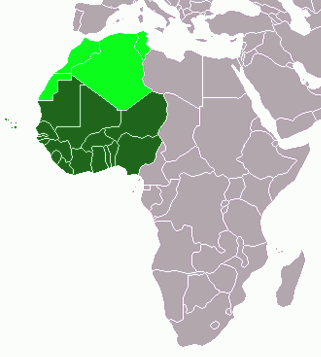
West
Africa location map - dark green ||
The
United Nations defines Western
Africa
as the 16 countries of Benin, Burkina Faso, Cape Verde, The Gambia, Ghana, Guinea, Guinea-Bissau, Ivory Coast, Liberia, Mali, Mauritania, Niger, Nigeria, Senegal, Sierra Leone, and Togo, as well as Saint Helena, Ascension and Tristan da Cunha (United Kingdom Overseas Territory). The population of West Africa is estimated at 419 million people as of 2021, and at 381,981,000 as of 2017, of which 189,672,000 were female and 192,309,000 male. The region is demographically and economically one of the fastest growing on the African continent.
Early history in West Africa included a number of prominent regional powers that dominated different parts of both the coastal and internal trade networks, such as the Mali and Gao Empires. West Africa sat at the intersection of trade routes between Arab-dominated North Africa and further south on the continent, the source of specialized goods such as gold, advanced iron-working, and ivory. After European exploration encountered rich local economies and kingdoms, the
Atlantic
slave trade built on already existing slave systems to provide labor for colonies in the Americas. After the end of the slave trade in the early 19th century, European nations, especially France and Britain, continued to exploit the region through colonial relationships. For example, they continued exporting a number of extractive goods, including labor-intensive agricultural crops like cocoa and coffee, forestry products like tropical
timber, and mineral resources like
gold. Since independence, many West African countries, like Ivory Coast, Ghana, Nigeria and Senegal, have played important roles in the regional and global economies.
West Africa has a rich ecology, with strong biodiversity and several distinct regions. The area's climate and ecology are heavily influenced by the dry Sahara to the north and east, which provides dry winds during the Harmattan, as well as the Atlantic Ocean to the south and west, which provides seasonal monsoons. This mixture of climates gives West Africa a rich array of biomes, from biodiversity-rich tropical
forests to drylands supporting rare and endangered fauna such as pangolins,
rhinoceros, and
elephants. Because of the pressure for economic development, many of these ecologies are threatened by processes like deforestation, biodiversity loss,
overfishing, pollution from mining, plastics and other industries, and extreme changes resulting from
climate change in West Africa.
Portuguese traders began establishing settlements along the coast in 1445, followed by the French, English, Spanish, Danish and Dutch; the African slave trade began not long after, which over the following centuries would debilitate the region's economy and population. The slave trade also encouraged the formation of states such as the Bono State, Bambara Empire and Dahomey, whose economic activities include but not limited to exchanging slaves for European firearms.
COLONIALISM
In the early 19th century, a series of Fulani reformist jihads swept across Western Africa. The most notable include Usman dan Fodio's Fulani Empire, which replaced the Hausa city-states, Seku Amadu's Massina Empire, which defeated the Bambara, and El Hadj Umar Tall's Toucouleur Empire, which briefly conquered much of modern-day Mali.
However, the French and British continued to advance in the Scramble for Africa, subjugating kingdom after kingdom. With the fall of Samory Ture's new-founded Wassoulou Empire in 1898 and the Ashanti queen Yaa Asantewaa in 1902, most West African military resistance to colonial rule resulted in failure.
Part of the West-African regions underwent an increase in the numeracy level throughout the 19th century. The reason for such a growth was predetermined by a number of factors. Namely, the peanut production and trade, which was boosted by the demand of the colonial states. Importantly, the rise of the numeracy was higher in the regions which were less hierarchical and had less dependent from the slavery trade (e.g. Sine and Salum). Whereas areas with the opposite trends illustrated opposite tendencies (e.g. central and northern Senegal). Those patterns were further even more stimulated with the French colonial campaign.
Britain controlled the Gambia, Sierra Leone, Ghana, and Nigeria throughout the
colonial era, while France unified Senegal, Guinea, Mali, Burkina Faso, Benin, Ivory Coast, and Niger into French West Africa. Portugal founded the colony of Guinea-Bissau, while Germany claimed Togoland, but was forced to divide it between France and Britain following
First World War due to the Treaty of Versailles. Only Liberia retained its independence, at the price of major territorial concessions.
Following World War II, nationalist movements arose across West Africa. In 1957, Ghana, under Kwame Nkrumah, became the first West African colony to achieve its independence, followed the next year by France's colonies (Guinea in 1958 under the leadership of President Ahmed Sekou Touré); by 1974, West Africa's nations were entirely autonomous.
Since independence, many West African nations have been submerged under political instability, with notable civil wars in Nigeria, Sierra Leone, Liberia, and Ivory Coast, and a succession of military coups in Ghana and Burkina Faso.
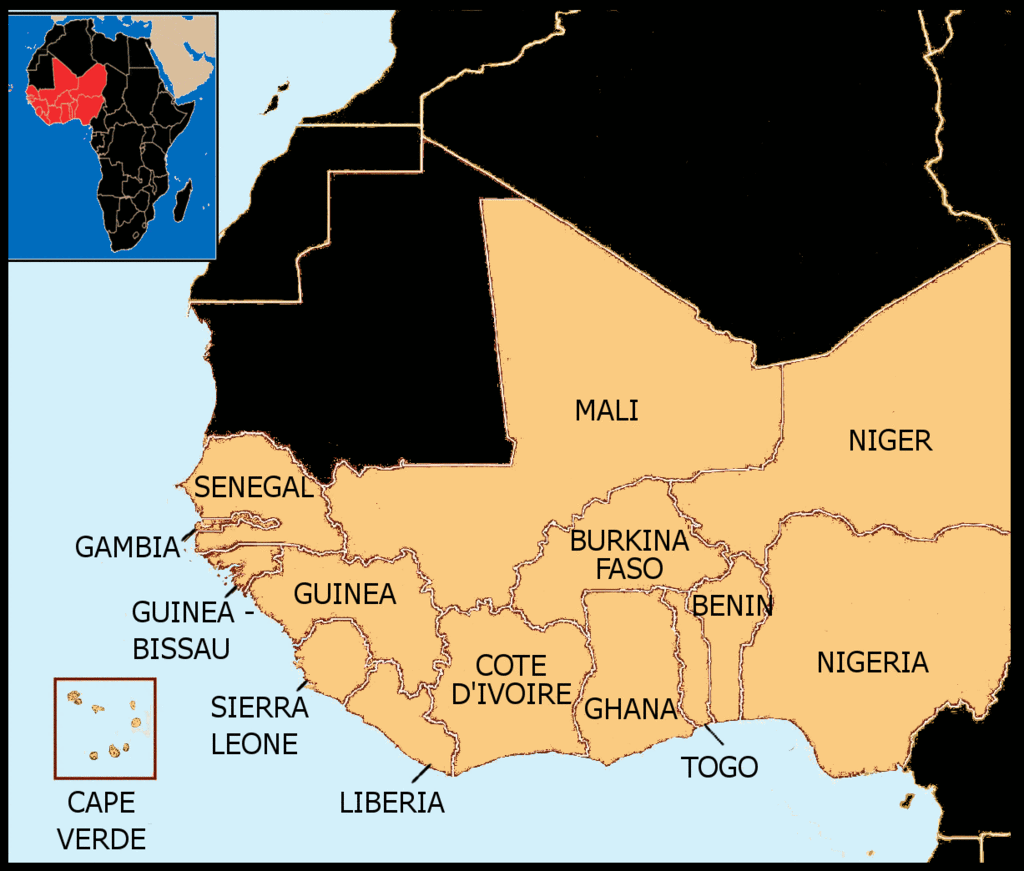
DEFORESTATION
West Africa is greatly affected by deforestation and has one of worst deforestation rate. Even "the beloved baobab tree" which is viewed as sacred by some West African cultures are under threat due to climate change, urbanization and population growth. "Huge swaths of forest are being razed to clear space for palm oil and cocoa plantations. Mangroves are being killed off by pollution. Even wispy acacias are hacked away for use in cooking fires to feed growing families." Nigeria, Liberia, Guinea, Ghana and the Ivory Coast, have lost large areas of their rainforest. In 2005, the Food and Agriculture Organization of the United Nations ranked Nigeria as the state with the worst deforestation rate in the entire world. Causes include logging, subsistence agriculture, and the collection of fuelwoods.
According to a ThoughtCo publication authored Steve Nix (2018), almost 90 percent of West Africa's original rainforest has been destroyed, and the rest "heavily fragmented and in a degraded state, being poorly used."
If they are not careful, they will turn the whole region into one big desert.
OVERFISHING
Overfishing is a major issue in West Africa. Besides reducing fish stocks in the region, it also threatens food security and the livelihoods of many coastal communities who largely depend on artisanal fishing. The overfishing generally comes from foreign trawlers operating in the region.
To combat the overfishing, Greenpeace has recommended countries reduce the number of registered trawlers operating in African waters, increase the monitoring and control and set up regional fisheries organizations. Some steps have already been taken in the form of WARFP (the World Bank's West Africa Regional Fisheries Program which empowers west-African countries (i.e. Liberia, Sierra Leone, Cape Verde, and Senegal) with information, training and monitoring systems. Furthermore, Liberia enacted a fisheries regulations Act in 2010 and installed a satellite-based monitoring system and Senegal enacted a fisheries code in 2015. In Cape Verde, the fishermen communities of Palmiera and Santa Maria have organized themselves to protect fishing zones. Mozambique finally created a conservation area, including a coastline.

DOOMSDAY
OPERATION GRAND SLAM -
Disillusioned extremists in Iran,
North Korea and Russia,
have grown impatient waiting for their leaders to act decisively, having
watched the Ukraine debacle
of Vladimir Putin rebound to weaken
their CRINK
axis members. This despite Hamas launching against Israel and
Houthi attacks on the Red
Sea. All that had the effect of waking the sleeping giant: NATO.
They
hatch a plot to kidnap top politicians from the west to create confusion,
as a prelude to an all out cyber
nuclear first and second strike, having first stockpiled sufficient gold
and weapons reserves, and fallout bunkers for their cells, to be able to
stage a second wave of conventional attacks, to in effect, take over the
world after the nuclear holocaust they
have engineered. Including assassinating their jaded leaders: Xi
Jinping; Vladimir
Putin, Iranian Grand Ayatollah, Ali
Khamenei, and Kim
Jong Un, supreme leader of communist North
Korea.
External
links
|
Africa,
Mali dance
- Youtube
|
Morocco
dance - Youtube
|
|
Zulu
dancing - Youtube
|
Zulu
wedding dance
- Youtube
|
|
Pack
lions
- Youtube
|
Ghana
tourism - Youtube
|
|
W.Africa
lions feeding - Youtube
|
Africa's
deadliest
- Youtube
|
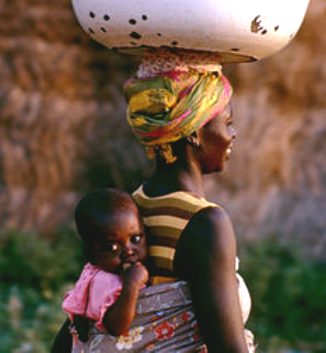
|
Adelaide
Aden
- Yemen
Afghanistan
Africa
Alaska
Albania
Algeria
Amazon
Rainforest
Amsterdam
Antarctic
- Scott
Arctic
North Pole
Argentina
Asia
Athens
Atlantis
- Plato's Lost City
Australia
Austria
Aztecs
- Mexico
Baghdad
Bahamas
Bahrain
Bangladesh
Barbados
Beachy
Head, England
Belgium
Benin
Berlin
Bermuda
Black
Rock Desert
Bohemia
Bolivia Bonneville
Utah History
Bonneville,
Utah, USA
Brazil
Brighton
- West Pier
British
Columbia
Buckingham
Palace
Bulgaria
Burkina
Faso
Burma
California
Canada
Canary
Islands
Cape
Horn
Cape
Verde
Cape
York - Au
Caribbean
Cayman
Islands
Central
Africa
Chichester
Harbour
Chile
China
Columbo
- Sri Lanka
Columbia
Corfu
Cowes,
Isle of Wight
Croatia
Crooked
Island, Bahamas
Cuba
Cyprus
Czechoslovakia
Darwin
- Australia
Daytona
Beach
Denmark
Eastbounre
Pier, England
Earthquakes
Ecuador
Egypt
Eindhoven Estonia
Equator
Europe
Falkland
Islands
Falmouth,
Cornwall
Fiji
Finland
Florida
France
Galapagos
Islands
Geography
Links
Geography
Mountains
Geography
Records
Geography
Resources
Geography
Statistics
|
Germany
Ghana
Gibraltar
- Links
Greece
Greenland
Guinea
Guinea
Bissau
Hawaii
Holland
the Nertherlands
Hollywood,
California, LA
Hong
Kong
Hungary
Hurricanes
Iceland
India
Indonesia
Links
Iran
Iraq
Ireland
Isle
of Man
Isle
of Wight
- The
Needles
Israel
Italy
Ivory
Coast
Jakarta
- Java
Jamaica
Japan
Johannesburg
Jordan
Kent,
England
Kenya
Korea
South Republic
Korea
North
Kuwait
Kyoto
Lanzarote,
Gran Canaria
Las
Vegas
Lebanon
Liberia
Libya
Liechtenstein
Life
on Earth
Lithuania
London
- Big
Ben
London
Eye
London
Houses
Parliament
London
- Buckingham
Palace
London
- Old
Bailey
London
- Overview
London
- The City
London
- Tower Bridge
London
- Trafalgar
Square
Luxembourg
Madame
Tussauds
Malaysia
Mali
Malta
Marshal
Islands
Mauritania
Maya
Empire -
Central America
Melbourne,
Australia
Middle
East
Mexico
Monaco
Morocco
Mountains
Mumbai
Naples-
Italy
National
Geographic
Nepal
New
York
New
Zealand
Niger
Nigeria
North
Africa
Norway
Nova
Scotia
Oceans
and Seas
Oman
Pakistan
Palermo
- Sicily
Palestine
Palma
- Malorca
|
Panama
Canal - Links
Paris
Pendine
Sands
Peru
Philippines
Pisa,
Leaning Tower
Planet
Earth
Poland
Port
Moresby - PNG
Port
Said - Egypt
Portugal
Puerto
Rico
Qatar
Quebec
Rio
de Janeiro
Romania
Rome
Russia
Salt
Lake City
Samoa
Saudi
Arabia
Scandanavia
Scotland
Senegal
Siera
Leone
Singapore
Solomon
Islands
Somalia
South
Africa
South
America
Southampton
Spain
- Espana
Sri
Lanka - Links
Stonehenge
Sudan
Suez
Canal
Sundancer
Holiday Resort
Sussex,
England Index
Sweden
Switzerland
Sydney,
Australia
Syria
Tahiti
- Polynesia
- Links
Tahitian
- Men & Women Customs
Taiwan
Thailand
The
Gambia
Togo
Tokyo,
Japan
Tonga
- Polynesia
Toronto
Trinidad
- Lesser Antilles
Trinidad
and Tobago
Tsunami
Tunbridge
Wells, England
Tunisia
Turkey
Tuvalu
Islands
UAE
- United Arab Emirates
UK
Statistics
Ukraine
United
Kingdom
United
Kingdom -
Gov
USA
Uruguay
Vanuatu
Islands
Vatican
City
Venezuela
Venice
Vienna
Vietnam
Volcanoes
Volendam
Wales
Washington
D.C.
WAYN
Where Are You Now
Wealden
iron industry
Wendover
West
Africa
World
Peace Supporters
Yemen
Yugoslavia
Zurich
|

Solar
Cola drinkers care about planet
earth
..
Thirst for Life

(330ml
Planet Earth can)
|










